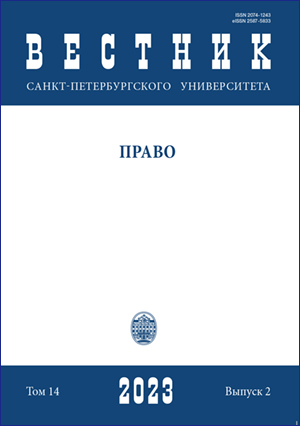Digital relationships as a subject of legal research
DOI:
https://doi.org/10.21638/spbu14.2023.213Abstract
The subject of legal science manifests itself as a result of the study of its object by methods suitable for the study of the object. A legal scholar must operate not only with formal legal research methods, but with other methods that allow one to understand the purpose and means of activity of a participant in digital relations, and then also the environment (digital technologies and regulatory frameworks) as an external factor influencing the behavior (will) of participants in digital relationships. These methods imply a difference in the types of human activity and relations, as well as their legal regimes: private and public digital relations and methods of their regulation. From a theoretical point of view, digital law is not a separate subdivision in the legal system, but a digital form of private and public digital relations, which requires new approaches to their regulation, but not replacing the content of digital relations with their form. Private digital relations are the result of legal communication (self-regulation) of participants in digital relations. Public digital relations are not relations of law, but relations of power and subordination (power relations). The constitutional aspects of the legal study of digital relations make it possible to find a balance in matters of state support for the development of digital technologies and ensuring human rights and freedoms in his digital relationship with the state. The digitalization of relations is only one of the means used by society and its public entities for the good of man, as his highest value. The state should not so much regulate technological processes as exercise state control over the activities of technology developers and protect the rights of participants in digital relations.
Keywords:
digital relation, subjects of digital relations, objects of digital relations, content of digital relations, digital legal relation, digital power relation, digital law, research methodology, human rights and freedoms
Downloads
References
Downloads
Published
How to Cite
Issue
Section
License
Articles of "Vestnik of Saint Petersburg University. Law" are open access distributed under the terms of the License Agreement with Saint Petersburg State University, which permits to the authors unrestricted distribution and self-archiving free of charge.






